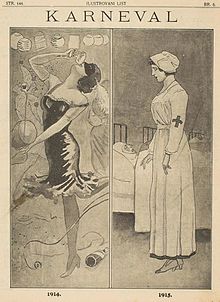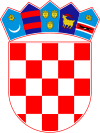| Croatia during World War I | |
|---|---|
| 1914–1918 | |
 1915 caricature from the Carnival magazine shows the sharp contrast of pre-war and wartime life in Zagreb | |
| Monarch(s) | Franz Joseph I (1914–1916) Charles I (1916–1918) |
| Leader(s) | Civil Bans: Ivan Skerlecz (1913–1917) Antun Mihalović (1917–1919) |
| History of Croatia |
|---|
 |
| Timeline |
|
|
The Triune Kingdom of Croatia, Slavonia and Dalmatia was part of Austria-Hungary during World War I. Its territory was administratively divided between the Austrian and Hungarian parts of the empire; Međimurje and Baranja were in the Hungarian part (Transleithania), the Kingdom of Croatia-Slavonia was a separate entity associated with the Hungarian Kingdom, Dalmatia and Istria were in the Austrian part (Cisleithania), while the town of Rijeka had semi-autonomous status.
The unification of Croat-inhabited territories was a fundamental problem that had not been resolved with the creation of Dual Monarchy in 1867. An excess of political problems within Austria-Hungary itself, exacerbated by the earlier Balkan Wars, led to a state of unrest, strikes, and series of assassinations within Croatia at the outbreak of World War I. Croatian policy amounted to either trying to find the best solution whilst staying within the empire (such as Trialism in Austria-Hungary or Austro-Slavism) or unifying with Serbia and Montenegro (namely Yugoslavism), thereby forming a South Slavic state. Political action was extremely limited during the war, with much of the power being held by the Austro-Hungarian military authorities. Calling for the creation of a unified South Slavic state was thus equated with treason.
During World War I, Croats fought mainly on the Serbian Front, the Eastern Front and the Italian Front, against Serbia, Russia, and Italy, respectively. A small number of Croats also fought on other fronts. Some Croats, mostly Croatian Americans or Austro-Hungarian Army deserters, fought on the side of the Allies. Croatia suffered great human and economic losses during the war, which were exacerbated by the outbreak of Spanish flu pandemic in 1918.[1] Although Croatians were less than 10% of the population, they accounted for approximately 13-14% of the Austro-Hungarian military conscripts. Croatian military losses likely amounted to 190,000 people, while some sources list about 137,000 military and 109,000 civilian casualties.[2]
With Austria-Hungary's imminent defeat and collapse, on 29 October 1918, the Croatian Parliament declared the country's secession from the empire. Croatia subsequently joined the short-lived State of Slovenes, Croats and Serbs, which was united with Serbia to form the Kingdom of Serbs, Croats and Slovenes on 1 December 1918.
- ^ Proleksis enciklopedija-Hrvati
- ^ https://hrcak.srce.hr/file/233073 Hrvatska u Prvom svjetskom ratu - Bojišta, stradanja, društvo (Croatia in WWI, Battlefields, losses, society); Filip Đukić, Marko Pavelić, Silvijo Šaur, in Croatian